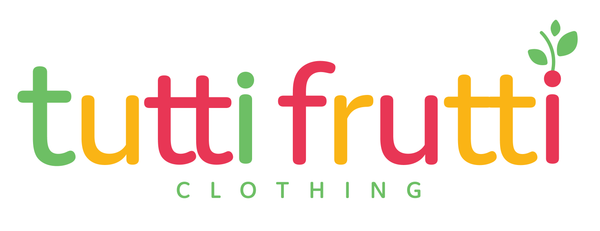
Organic vs. Oeko-Tex: The Kids' Clothes Choice
As the owner at Tutti Frutti Clothing, I'm passionate about handmade and organic clothing and finding the best toys and gifts for even the tiniest members of your family.

My commitment goes beyond creating adorable outfits and finding cute toys; it extends to ensuring that every item I offer not only looks good but is also gentle on your little one's skin and our planet. That's why I've chosen to only work with organic cotton in my handmade clothing.
How Organic Cotton is Grown
The journey of organic cotton begins with mindful farming practices. Organic farmers do not use synthetic pesticides and fertilisers. They rely on natural methods like crop rotation, composting, and beneficial insects to maintain soil health and ward off pests. This fosters a balanced ecosystem, nurturing healthier cotton plants without compromising the environment.
Moreover, organic cotton farming prioritises water conservation through efficient irrigation methods and rainwater harvesting which minimises the strain on water resources.
The benefits extend beyond the fields. Organic cotton's purity ensures that during processing, only non-toxic substances are used, safeguarding the health of workers and preserving the integrity of the fabric. This translates into clothing free from residual chemicals, providing peace of mind to parents.
Benefits for People and Planet
The impact of choosing organic cotton are really positive for both people and the planet:
-
Healthier Skin: The absence of harmful chemicals reduces the risk of skin allergies and irritations, especially for individuals with sensitive skin, making it ideal for babies and children.
-
Environmental Preservation: Organic cotton farming fosters biodiversity, maintains soil fertility, and reduces water pollution, contributing to a more sustainable and ecologically balanced planet.
-
Supporting Communities: By embracing organic cotton, we stand in solidarity with farmers and workers, advocating for fair wages and ethical practices in the textile industry.
Organic vs. Oeko-Tex: Understanding the Difference
You might see Oeko-Tex on labels when you buy children's clothing. It is often promoted as being a better fabric than 'regular' cotton - but what is the difference between Oeko-Tex and organic cotton?
Organic cotton refers to cotton grown without synthetic pesticides or fertilisers, embracing natural processes to maintain soil health and biodiversity. This means no harmful chemicals touch the fabric, resulting in garments that are hypoallergenic, soft, and safe for delicate skin.
On the other hand, Oeko-Tex certification ensures that the finished textile product has been tested and verified as free from harmful substances. While Oeko-Tex fabrics may not be organic, they are considered safe for human use and adhere to strict global standards, ensuring they pose minimal risk to health.
Why Organic Cotton is Better Than Oeko-Tex Cotton
While Oeko-Tex certification ensures that the final textile product is free from harmful substances, it doesn't guarantee the same eco-friendly growing practices that organic cotton embodies. Here's a closer look at why organic cotton is better than Oeko-Tex-certified cotton in terms of its environmental impact, particularly concerning growing practices:
Growing Practices:
-
Chemical Use: Organic cotton is cultivated without synthetic pesticides or fertilizers. This fundamental difference is crucial as conventional cotton, including that certified by Oeko-Tex, often relies on chemical-intensive methods. These chemicals pose risks to soil health, water systems, and biodiversity. They can contaminate local water sources, harm wildlife, and have long-lasting adverse effects on ecosystems.
-
Soil Health: Organic cotton farming emphasises practices that nurture soil health, such as crop rotation, composting, and the use of natural fertilisers. These methods support biodiversity and maintain the fertility of the soil, fostering a more sustainable and resilient agricultural system. In contrast, conventional cotton farming practices, even those meeting Oeko-Tex standards, may degrade soil quality over time due to chemical reliance.
-
Water Conservation: Organic cotton farming tends to use less water than conventional methods, prioritising efficient irrigation systems and rainwater harvesting. Conversely, conventional cotton farming, including that conforming to Oeko-Tex standards, often involves heavy water usage and contributes to water pollution through chemical runoff.
Environmental Impact:
-
Biodiversity: Organic cotton farming promotes biodiversity by supporting a more balanced ecosystem. It encourages the presence of beneficial insects, birds, and other wildlife that contribute to pest control and pollination. In contrast, conventional cotton farming methods, even if Oeko-Tex certified, may disrupt natural ecosystems due to the use of chemical pesticides.
-
Long-term Sustainability: Organic cotton's emphasis on sustainable farming practices ensures the preservation of resources for future generations. This includes reducing reliance on synthetic inputs, conserving water, and maintaining soil fertility. While Oeko-Tex certification focuses on the end product's safety, it doesn't inherently require the same level of commitment to sustainable farming methods throughout the cotton's growth cycle.
In brief, while the Oeko-Tex certification is valuable in ensuring textile safety, organic cotton's superiority lies in its holistic approach to farming that puts environmental sustainability above everything else. It's not solely about the absence of harmful substances in the final product but also about minimising ecological harm throughout the entire production process.
By choosing organic cotton, we can actively support a farming system that goes beyond avoiding harmful chemicals; it embraces practices that foster a healthier planet for current and future generations.
My commitment to using organic cotton isn't just about creating adorable and safe clothing; it's about making a conscious choice for the well-being of your child and our planet. Each stitch, each process, and every item in our collection embodies this dedication, ensuring that your little one gets the best, from seed to garment.
Thank you for joining us on this journey towards a healthier, happier world for our children. We're thrilled to have you be a part of it.


